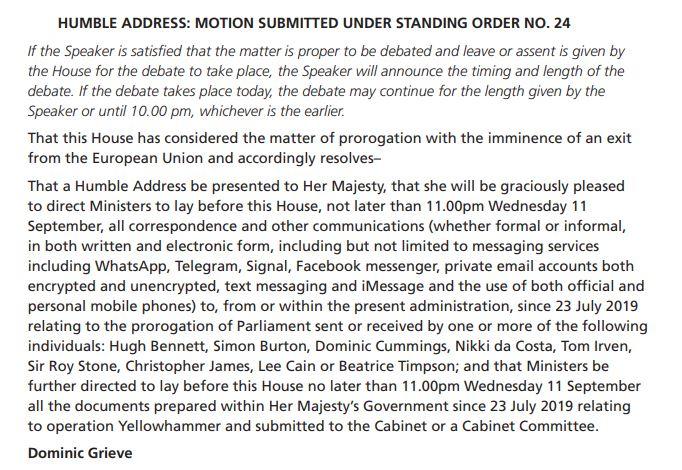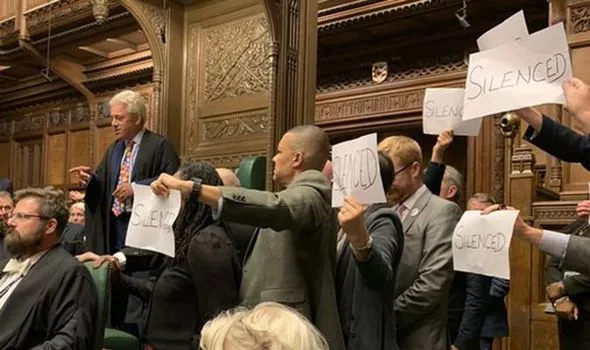10 September 2019 | UK NEWS
Parliament was officially prorogued until 14 October a little before 2am last night, amid clear signs of indignation and outrage among MPs. Members on the Opposition benches did not follow the Government benches out of the Commons chamber and into the Lords to hear the prorogation announcement, as is traditionally expected.
Conversely, the Leader of the House, Jacob Rees-Mogg, reportedly instructed Conservative MPs not to return to the Commons following this. The Speaker, John Bercow, also expressed his dissatisfaction just prior to the formal procedure beginning, describing this prorogation as “an act of executive fiat”. Members were seen holding up signs saying “SILENCED” as the events unfolded.
The move was the final development on a tumultuous day of many yesterday. The first of which was the Queen giving Royal Assent to the Bill proposed by Hilary Benn (dubbed by its critics the ‘Surrender Bill’) at around 3:30pm. It is now officially on the statute book as the ‘European Union (Withdrawal) (No. 6) Bill’.
Very shortly afterwards, the Speaker announced his own resignation, stating that he had never intended to serve through another election and would consequently be stepping down either at the time of the next election or on 31 October, whichever was sooner. He also announced that he would not be standing again as an MP.
The move has been seen as Mr Bercow choosing to ‘go on his own terms’, following recent signals from the Conservative Party that it would break with tradition and stand a candidate against Bercow in his Buckingham constituency at the next election. The Speaker’s announcement was followed by almost an hour and a half of tributes from MPs to his ten years of service, coming largely from those on the Opposition benches. Indeed, the Opposition members applauded his resignation announcement – applause is not traditionally permitted in the Commons chamber.
Some in Westminster have also interpreted the Speaker’s decision as an attempt to ensure his replacement is in place before the next election, so that the Prime Minister cannot install a pro-Brexit candidate in the position if he were to win a significant majority. Indeed, the Government benches were looking decidedly displeased with the move as the tributes rolled in from elsewhere in the chamber.
This was followed by the Speaker choosing to grant an emergency debate proposed by Dominic Grieve (now sitting as an independent MP) to compel the Government to hand over all communications, including private ones, surrounding prorogation on the part of key named staff. The full text of the Humble Address motion is here:

The debate proceeded as scheduled and was voted on, with the result being announced around 7:30pm. The Government lost the vote by 311-302, although technically it is not binding upon the administration. Indeed, a Downing Street source is reported to have told ITV that: “under no circumstances will Number 10 staff comply with Grieve’s demands regardless of any votes in Parliament.” There are also suggestions that the outcome of the vote itself may breach data protection or human rights legislation, in respect of the right to individual privacy.
Another debate then followed, this time put forward by Jeremy Corbyn, on the importance of the Government respecting the rule of law. This continued for some while, although there was no vote at the conclusion of it – the motion was simply carried without the need for a division. It carries no legal effect.
After this, and following a debate on a series of motions concerning Northern Ireland, in response to amendments put forward to legislation in the House of Lords concerning the restoration of parliamentary buildings in NI, the final major debate of the evening began as the Prime Minister arrived in the Commons around 10:30pm. He moved a motion “that there should be an early General Election” for the second time, following last Wednesday’s defeat.
The Government had initially held out hopes of this motion being approved, given that a deal was struck with the Opposition Whips in the early hours of last Thursday for the Government’s Lords to cease filibustering the passage of the Benn Bill, in exchange for an election being approved the second time around. However, certainly by the time of the vote, these had been all but dashed as the Opposition had indicated over the weekend that they would renege on this agreement.
As such, the Government once again won the vote by 293-46, but this did not achieve the required majority of 434 MPs voting in favour of the motion. The result of the vote was announced around 00:30, around an hour later than originally envisaged. This was followed by a response from the PM, who said, “the House cannot choose, it will not let anyone else choose. It resolves only to be irresolute, decides only to be undecided, determined to dither, adamant for drift.”
Finally, the Commons moved towards prorogation. With the formal procedure for this finally completed in the early hours of the morning, it means that Parliament will not now sit again until 14 October, when there will be a new Queen’s Speech.
























